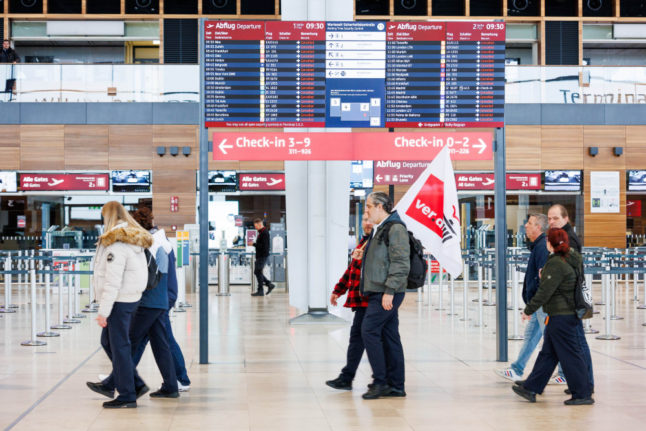Security staff at airports in Berlin, Cologne, Hamburg, Karlsruhe/Baden-Baden and Stuttgart participated in an all-day warning strike on Thursday. These employees are responsible for screening passengers, staff, goods and cargo in the airport for the Federal Police.
According to estimates by the German Airports Association (ADV), around 90,000 passengers were affected in the ongoing dispute for better wages and working conditions.
More than 580 flights were cancelled due to the all-day action, according to the ADV.
Some airports – such as in Berlin – completely axed all departures, while others only partially cancelled their flight line up.
“Due to the announced warning strike, no departures of passenger flights will be possible at Berlin Brandenburg Airport (BER) on this day,” wrote BER airport in a statement.
The trade union Verdi said in a statement that the strikes will increase the pressure before the sixth round of negotiations on March 19th.
“The employers recently presented an improved but still inadequate offer,” said Verdi negotiator Wolfgang Pieper. “Our goal remains to permanently compensate for the employees’ loss of purchasing power.”
‘Strikes must stop’
Ralph Beisel, the ADV managing director, said the strikes must end.
“The airports are not a collective bargaining party in this dispute, but are once again becoming the venue for the conflict of interest,” Beisel said.
“In Germany we experience strike announcements to the detriment of mobility and the economy almost every day. This must be stopped.”
More than 1,100 flights were canceled or delayed during the first wave of warning strikes on February 1st at 11 German airports because passengers could not go through security, according to estimates by ADV.
Incoming flights may also face cancellations because of the strike. Affected passengers should reach out to their airlines for alternative travel options.
The Verdi trade union is asking for €2.80 more in hourly wages, increased bonuses and boosted overtime bonuses from the first overtime hour to keep pace with inflation.
The employer offered a €1.20 increase to hourly pay on March 1st. It would then increase by an additional €0.75 on October 1st and again on April 1st, 2025, according to a Verdi union statement.
The strike is the latest to hit Germany’s embattled aviation sector. Passengers flying with Lufthansa in Frankfurt and Munich faced cancellations after cabin crews called a two-day strike earlier this week.
The Verdi union is currently conducting collective bargaining negotiations across the aviation industry for Lufthansa ground staff, airport security employees and employees at the Leipzig/Halle and Dresden airports.
This season of labour unrest is not limited to flights. Industrial action has also hit supermarkets, transportation and the civil service.
READ ALSO: Why Germany is being hit by strikes almost every day



 Please whitelist us to continue reading.
Please whitelist us to continue reading.
Member comments